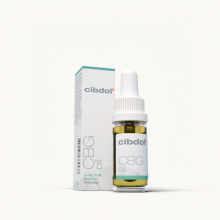Is CBG good for gut health?
Published:
The health of your gastrointestinal (GI) system is closely tied to overall wellbeing. When the delicate balance of gut bacteria is disrupted, it can lead to inflammation, pain, and diseases. Pharmaceuticals for gut health can have negative side effects. This has prompted growing interest in natural options like cannabis-derived CBG. But what does the research say so far about CBG for gut health?
Contents:
- What Causes Poor Gut Health?
- What is CBG and How Could It Support Gut Health?
- Current Research on CBG for Gut Disorders
- Potential Gut Health Benefits of Taking CBG
- Considerations When Using CBG for Gut Health
- Taking CBG For Gut Health: Dosage and Safety
- Lifestyle Changes That Also Support Gut Health
- Fact Section
- Is CBG good for gut health? Conclusion
- Resources used to write this article
This article reviews the evidence on using CBG for gut issues and key considerations.

What Causes Poor Gut Health?
To understand if CBG may improve gut function, it helps to first know what contributes to poor gut health. Some common causes include:
- Food sensitivities and allergies that trigger inflammation
- Infections from bacteria, viruses, or parasites
- Overgrowth of harmful gut bacteria or lack of probiotics
- Chronic stress altering microbiome balance
- Low fiber diets lacking prebiotics to feed good bacteria
- Antibiotics that deplete beneficial bacteria
- NSAIDs and pain relievers that damage gut lining
- Autoimmune disorders like Crohn’s disease or celiac
- Excess alcohol, which is toxic to GI tissues
These and other factors can disrupt the microbiome and integrity of the gut lining, leading to chronic issues. Determining if CBG may help requires looking at the mechanisms involved.
What is CBG and How Could It Support Gut Health?
CBG stands for cannabigerol, a non-intoxicating compound in hemp and cannabis plants. Early studies indicate CBG may benefit gut issues via:
Activating CB1 and CB2 receptors – CB1 and CB2 receptors are found throughout the GI tract and play a regulatory role in gut motility, secretion, and inflammation. CBG stimulates both receptors.
Modulating gastrointestinal motility – Research shows CBG can stimulate smooth muscle contractions in the colon, suggesting a role in healthy motility.
Regulating intestinal inflammation – CBG demonstrates anti-inflammatory properties by inhibiting proinflammatory cytokines and nitric oxide (NO) production which are elevated in gut disorders.
Relieving pain and cramping – CBG has been shown to have analgesic and muscle relaxing effects, which could ease GI discomfort.
Supporting healthy gut microbiota – Studies indicate CBG has antimicrobial effects on harmful gut bacteria while preserving populations of beneficial bacteria.
Through these mechanisms, CBG may be able to improve many aspects of gut health. But what does the direct research show so far?
Current Research on CBG for Gut Disorders
Unfortunately, clinical studies testing CBG specifically for human gut health are still extremely limited. However, a few promising early studies have emerged:
- A 2013 study found CBG reduced inflammation, oxidative stress, and intestinal damage in a mouse model of inflammatory bowel disease (IBD).
- A small 2020 human pilot study showed a combination CBD and CBG oil improved symptoms and quality of life in Crohn’s disease patients.
- A 2021 review noted CBG demonstrated antibacterial effects against common gut pathogens like E. coli and C. difficile in test tube studies.
- A 2018 study showed CBG pure extract reduced muscle contractions induced by inflammatory agents in isolated guinea pig ileum samples.
- A 1990 study found CBG stimulated motility in isolated segments of rabbit small intestine and rat colon samples.
While human clinical data is minimal presently, these preclinical studies help demonstrate CBG’s potential mechanisms for supporting gut health seem valid and warrant further investigation. Larger scale human trials are needed.
Potential Gut Health Benefits of Taking CBG
Based on the limited research available so far, possible gut health benefits of taking CBG may include:
- Reduced abdominal pain, cramping, and discomfort
- Improved regularity and motility
- Increased good bacteria populations through prebiotic support
- Lowered inflammation linked to IBD, IBS, and autoimmune conditions
- Faster recovery from GI infections
- Decreased oxidative stress and intestinal damage
- Relief of nausea and loss of appetite
- Enhanced nutrient absorption from increased gut integrity
- Improved immunity through beneficial impact on gut-immune interactions
However, these benefits need confirmation through more rigorous clinical studies. Current evidence is primarily preclinical.
Considerations When Using CBG for Gut Health
While intriguing, there are some important factors to consider before using CBG for gut issues:
- Human data is very limited presently. CBG’s efficacy and safety for gut problems remain unconfirmed.
- Optimal dosing regimens are unknown. Starting low and increasing gradually based on feedback is advised.
- The quality and composition of CBG supplements varies substantially. Products should have independent testing.
- CBG may interact with medications for GI issues like antidiarrheals, laxatives, antispasmodics. Check with a pharmacist.
- CBG should not replace standard treatments or dietary changes recommended by your doctor.
- Those with past cannabis-induced anxiety should use caution as CBG may potentially worsen anxiety symptoms.
- Long-term impacts of daily CBG use have not been evaluated. Monitoring closely for side effects is important.
Carefully weighing potential benefits and risks of CBG with your physician is advised, especially for moderate to severe gut problems.
Taking CBG For Gut Health: Dosage and Safety
If trying CBG for gut issues, some tips for safe use include:
- Consult your doctor on an appropriate CBG dosage and schedule based on your symptoms. Follow dosing guidance closely.
- Start with a low CBG dose like 5-10 mg once daily and slowly titrate up to a maximum of around 50 mg twice per day if needed and tolerated.
- Try taking CBG doses right before meals for maximum effect on GI motility and pain.
- Choose high purity CBG oils, capsules, or isolates from reputable suppliers. Avoid untested products.
- Keep notes on any symptom changes and side effects to share with your doctor so they can adjust the regimen accordingly.
- Use CBG cautiously with sedatives, alcohol, blood thinners, and immunosuppressants due to potential interactions.
Proper medical guidance is advised when using novel supplements like CBG, especially for existing health conditions.
Lifestyle Changes That Also Support Gut Health
While more research is still needed on CBG and gut function specifically, some evidence-based lifestyle tips for improving gut health include:
- Eating more prebiotic and probiotic foods like yogurt, kimchi, onions, garlic, bananas, and legumes.
- Prioritizing high fiber fruits, vegetables, nuts and whole grains.
- Staying well hydrated with water and limiting alcohol intake.
- Managing stress levels through meditation, yoga, cognitive behavioral therapy, etc.
- Getting regular physical activity, which supports healthy motility.
- Taking a probiotic supplement if recommended by your doctor.
- Avoiding unnecessary antibiotics and NSAID use, which can disrupt gut flora.
- Cutting out confirmed food sensitivities/allergens like gluten, dairy, etc.
- Getting enough sleep and adopting healthy sleep hygiene habits.
A multifaceted approach combining lifestyle strategies with any potential natural supplements under medical supervision is ideal for optimal gut health.
Fact Section
Here are some important facts about the gut microbiome, CBG and improving gut function:
- The gut contains over 1000 different species of bacteria that help regulate immunity, digestion, nutrient absorption and more.
- Imbalances in gut bacteria composition are linked to gastrointestinal issues like IBS, IBD, infections, and even anxiety and autoimmunity.
- CBG is a natural compound in cannabis shown in preclinical studies to have anti-inflammatory, antimicrobial, analgesic, and gut motility-regulating effects.
- Research indicates CBG may activate CB1 and CB2 receptors throughout the GI tract involved in reducing gut inflammation and modulating motility.
- Small studies have found promising results for CBG improving symptoms of IBD and IBS patients. Larger scale clinical trials are still needed.
- Potential benefits of CBG for gut health include reduced cramping, improved regularity, increased good bacteria, lowered inflammation and oxidative stress.
- Starting slowly at low doses and monitoring side effects is important since human research is limited on the safety and efficacy of CBG gut supplements.
- Lifestyle changes to diet, stress, sleep and exercise are also key to support the delicate microbial balance required for optimal gut health.
Is CBG good for gut health? Conclusion
In summary, the gut microbiome plays a crucial role in overall health. When imbalances in gut bacteria occur, it can lead to issues like infections, pain, cramping, inflammation and more. Some early research indicates the cannabis compound CBG may support gut health through its anti-inflammatory, pain-relieving, antimicrobial and motility-regulating effects.
Small studies have found promising results for CBG reducing gut inflammation and improving quality of life in conditions like IBD and IBS. However, large scale human trials confirming efficacy and safety are still lacking at this time. Those interested in trying CBG for gut function should thoroughly discuss potential benefits and risks with their doctor and monitor closely for side effects. Starting slowly with low doses and making dietary and lifestyle changes are also key for optimizing gut health. In conclusion, while more research is still needed, CBG appears to have potential for supporting a healthy microbiome and gut function in some individuals based on current preclinical evidence.
Resources used to write this article
For an overview of gut health:
- Harvard Health Publishing. (2021). The gut-brain connection. https://www.health.harvard.edu/diseases-and-conditions/the-gut-brain-connection
- Cani PD. (2018). Human gut microbiome: hopes, threats and promises. British Journal of Clinical Pharmacology, 9, 1763-1767. https://doi.org/10.1111/bcp.13617
For information on how CBG works:
- Morales, P., Hurst, D. P., & Reggio, P. H. (2017). Molecular Targets of the Phytocannabinoids: A Complex Picture. Progress in the chemistry of organic natural products, 103, 103–131. https://doi.org/10.1007/978-3-319-45541-9_4
- DiPatrizio, N. V. (2016). Endocannabinoids in the Gut. Cannabis and cannabinoid research, 1(1), 67–77. https://doi.org/10.1089/can.2016.0001
For research studies on CBG and the gut:
- Borrelli, F., Fasolino, I., Romano, B., Capasso, R., Maiello, F., Coppola, D., Orlando, P., Battista, G., Pagano, E., Di Marzo, V., & Izzo, A. A. (2013). Beneficial effect of the non-psychotropic plant cannabinoid cannabigerol on experimental inflammatory bowel disease. Biochemical pharmacology, 85(9), 1306–1316. https://doi.org/10.1016/j.bcp.2013.01.017
- Ahmed, W., Katz, S. (2020). Therapeutic Use of Cannabis in Inflammatory Bowel Disease. Gastroenterology & Hepatology, 16(11), 612-621.















